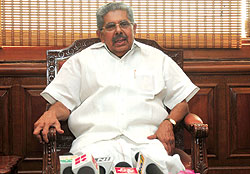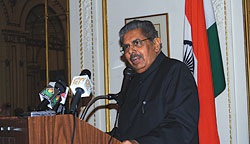|
Mr Vayalar Ravi
Minister for Overseas Indian Affairs
|
|
“Priority area is focus on diaspora youth”
|
|
Mr Vayalar Ravi, veteran Congressman and political leader from Kerala has been helming the Ministry of Overseas Indian Affairs for 7 years. In between he’s held additional charge of crucial ministries in the Government of India such as Parliamentary Affairs, Civil Aviation and Micro Small and Medium Enterprises (MSME). As Minister for Overseas Indian Affairs, Mr Ravi has travelled extensively around the world, crisscrossing continents to meet with the diaspora. He has been hearing out their aspirations and expectations from their engagement with India, and has delivered six Mini PBDs (New York, Singapore, Durban, Holland, Canada and Mauritius). He has introduced several new institutions over the years aimed at improved and quality engagement with the Indian Diaspora such as the Overseas Indian Facilitation Centre (OIFC)—that runs as a private public partnership between the MOIA and the Confederation of Indian Industry (CII), the Indian Council of Migration, the India Development Foundation for Overseas Indians, Global INK. Several programmes for youth such as the Know India Programme, Study India Programme and Scholarship Programme for Diaspora Children have been introduced to engage the diaspora youth, one of the minister’s top priority areas of focus. While it is never easy to deal with the differing aspirations of the descendants of the older immigrants and those of the newer immigrants, Mr Ravi has tried to balance both in the best possible manner even as he has tried to make a fledgling, and one of the smallest ministries in the Government, become one of the most important ones in India.
The Pravasi Bharatiya Divas (PBD), India’s annual engagement with the Indian Diaspora in January, is being held in Kochi in 2013. While Hyderabad and Chennai in south India have already hosted the PBD (in 2006 and 2009), this is the first time that Kerala will be hosting this event. The registered attendance is expected to go up for two reasons: one because Mr Ravi represents Kerala and has a vast following among the Indian Diaspora from Kerala and secondly because the Government planned a Mini PBD in Dubai (in September 2012) but cancelled it as it wanted to host the main PBD in Kerala. A number of people from this state stationed in the Gulf who couldn’t get a PBD in Dubai are expected to attend and boost up overall registration. The Gulf Cooperation Council (6 countries) alone accounts for over 5 million members of the Indian diaspora, about a 5th of the total across the world.
Mr Ravi spoke to India Empire’s Editor and Publisher Sayantan Chakravarty at his 10th floor office in New Delhi’s Akbar Bhavan
|
|

|
The theme of the forthcoming PBD is “Engaging Diaspora – The Indian Growth Story”. How did you arrive at this theme?
It has been my thinking over many decades of my political career to involve everyone in India’s growth, make it more inclusive. India is a vast country with diversities. There are people who live in great disparity, and it should always remain the goal of leadership to deal with imbalances, at the level of society, at the level of income, and at the level of status. With this larger canvas in mind, we thought of involving the diaspora in this inclusive growth process. Indian diaspora is an important part of this growth.
An Amnesty Scheme has been announced by the Government of UAE that allows illegal immigrants to leave the country without facing prosecution. What part has MOIA played in securing this relief?
The most important thing at this point in time is that of the total expatriates who have been asked to leave the UAE under this scheme, the number of Indians is the least. This number has come down over the years. This is what I have been informed by the Indian ambassador to the UAE. The reason why the number of illegal immigrants has come down is due to years of efforts on all fronts by this ministry. We have advertised heavily over the past 2 to 3 years, asking those seeking emigration to be careful about unscrupulous agents who make false promises and have asked them to make sure that due checks are made before signing up with companies in the UAE. We have come down on the agents, and they fear us now. We are in a position to cancel their licenses if malpractice is reported, we can initiate criminal action and prosecution subsequently. The result is that the number of illegal immigrants has come down in the
UAE.

Mr Ravi has diligently worked towards establishing closer ties with the Indian diaspora
Are you expecting the diaspora in the Gulf to attend the PBD in large numbers?
Yes we are. Whenever I interact with the diaspora in the Gulf, I get plenty of complaints. One of the major complaints relates to Air India services. There is no doubt that Air India needs to streamline itself more, make itself more available, and more visible. When I held the Civil Aviation portfolio (as a Minister in the Government of India), I shifted the Air India Express office to Kochi because it caters to the Gulf traffic to south India. The problem is that the majority of the Air India pilots are concentrated in Mumbai, and small numbers in Delhi. Air India is suffering because of this. When a pilot has to fly to the Gulf from Kochi, his duty starts in Mumbai. This is not a practical situation. We need to decentralize and work towards a pilot resettlement scheme.
What is the progress on the Pravasi Bhartiya Kendra?
The Kendra office will be opened in another 2 to 3 months. I will be shifting there. It will be exclusively for the MOIA. There will be an exhibit area and other facilities and make it easier for the Indian Diaspora to interact with us.
Several Social Security Agreements are in place now. How will it help the Indian Diaspora?
We have signed with 15 countries. These agreements have been negotiated to protect the interest of expatriate workers. They provide exemption from social security contribution, and allows for exportability of pension in case of relocation to the home country or any third country. They prove beneficial for the companies as exemption from social security contribution, in respect of employees, reduces their costs.
The future of the diaspora’s interaction and engagement with India will be led by the next generation, mainly the youth. How are you encouraging the youth in the Indian diaspora in this regard?
Let me tell you that youth connectivity is a top most priority for us. It is most important, and I take it very seriously. I cannot claim that I’ve been totally successful in engaging with the youth, but the process has started, and sincere efforts are on in that direction. I interact with associations all over the world, and realize that one of the best methods of engagement is to treat everyone as one family. Once you can reach out to Indians at the level of emotions, connectivity follows. The Indian network is vast, spread out in every corner of the world. While I understand that every diaspora member needs to be loyal to the country of domicile, it is also important that we help remind them of Indian culture, their roots, and their country of origin. To connect at that level, to evoke the sentiment of belonging to the same family, takes time. But we are seriously working on those lines. We realize the importance of Bollywood in maintaining this connectivity and this time have a session on films. We also want our missions to play a very proactive role in this direction, some of them are already doing so.
A word on increasing NRI remittances, it beats FDI remittances…
It is true. Latest figures say that annual remittance has crossed USD 63 billion. I have seen this figure grow during the past 7 years that I’ve helmed this Ministry. It is a very welcome sign. It shows that Indians feel safe to deposit their money with Indian banks. The money helps the families of the Indian diaspora to lead a better
life.
|
|
|
|
|
|
January 2013
|
|


|
|
|
|
|
|